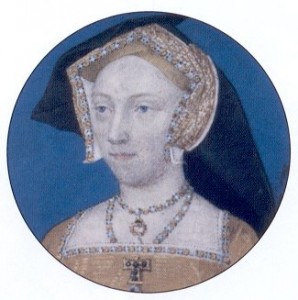 In a letter dated 1st April 1536, Eustace Chapuys, the imperial ambassador, reported to Charles V, Holy Roman Emperor, that he had just received a message from the Marchioness of Dorset corroborating news that he’d already heard from a “maistre gelyot”. This news was that the King had been “paying court at Greenwich” to Jane Seymour and that he had sent her a purse of sovereigns accompanied by a letter. According to the information Chapuys had received, Jane’s reaction to receiving this gift was as follows:
In a letter dated 1st April 1536, Eustace Chapuys, the imperial ambassador, reported to Charles V, Holy Roman Emperor, that he had just received a message from the Marchioness of Dorset corroborating news that he’d already heard from a “maistre gelyot”. This news was that the King had been “paying court at Greenwich” to Jane Seymour and that he had sent her a purse of sovereigns accompanied by a letter. According to the information Chapuys had received, Jane’s reaction to receiving this gift was as follows:
“the young damsel, to whom he is paying court, after respectfully kissing the letter, returned it to the messenger without opening it, and then falling on her knees, begged the royal messenger to entreat the King in her name to consider that she was a well-born damsel, the daughter of good and honourable parents without blame or reproach of any kind; there was no treasure in this world that she valued as much as her honour, and on no account would she lose it, even if she were to die a thousand deaths. That if the King wished to make her a present of money, she requested him to reserve it for such a time as God would be pleased to send her some advantageous marriage.”
The Marchioness told Chapuys that “in consequence of this refusal the King’s love for the said damsel had marvelously increased”. She also said that the King had resolved that he would from now on only see Jane if she was chaperoned by one of her relatives, which would be easy now that he had given Thomas Cromwell’s apartments to Edward Seymour, Jane’s elder brother, and his wife.
According to Chapuys, Jane was being coached in how to appeal to the King and also to turn him against Anne Boleyn. Chapuys explains:
“But I hear that the young lady has been well tutored and warned by those among this King’s courtiers who hate the concubine, telling her not in any wise to give in to the King’s fancy unless he makes her his Queen, upon which the damsel is quite resolved. She has likewise been advised to tell the King frankly, and without reserve, how much his subjects abominate the marriage contracted with the concubine, and that not one considers it legitimate, and that this declaration ought to be made in the presence of witnesses of the titled nobility of this kingdom, who are to attest the truth of her statements should the King request them on their oath and fealty to do so.”
In the same letter, Chapuys also reported that his sources had told him that Anne Boleyn and Thomas Cromwell were “on bad terms” and “that there had been a talk of a new marriage for this King”. This, of course, was just over a month before Anne Boleyn’s arrest.
Notes and Sources
- Calendar of State Papers, Spain, Volume 5 Part 2: 1536-1538, 43.